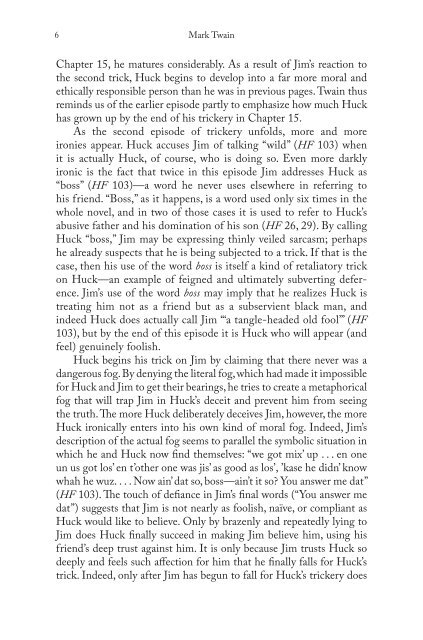Blooms Literary Themes - THE TRICKSTER.pdf - ymerleksi - home
Blooms Literary Themes - THE TRICKSTER.pdf - ymerleksi - home
Blooms Literary Themes - THE TRICKSTER.pdf - ymerleksi - home
You also want an ePaper? Increase the reach of your titles
YUMPU automatically turns print PDFs into web optimized ePapers that Google loves.
6<br />
Mark Twain<br />
Chapter 15, he matures considerably. As a result of Jim’s reaction to<br />
the second trick, Huck begins to develop into a far more moral and<br />
ethically responsible person than he was in previous pages. Twain thus<br />
reminds us of the earlier episode partly to emphasize how much Huck<br />
has grown up by the end of his trickery in Chapter 15.<br />
As the second episode of trickery unfolds, more and more<br />
ironies appear. Huck accuses Jim of talking “wild” (HF 103) when<br />
it is actually Huck, of course, who is doing so. Even more darkly<br />
ironic is the fact that twice in this episode Jim addresses Huck as<br />
“boss” (HF 103)—a word he never uses elsewhere in referring to<br />
his friend. “Boss,” as it happens, is a word used only six times in the<br />
whole novel, and in two of those cases it is used to refer to Huck’s<br />
abusive father and his domination of his son (HF 26, 29). By calling<br />
Huck “boss,” Jim may be expressing thinly veiled sarcasm; perhaps<br />
he already suspects that he is being subjected to a trick. If that is the<br />
case, then his use of the word boss is itself a kind of retaliatory trick<br />
on Huck—an example of feigned and ultimately subverting deference.<br />
Jim’s use of the word boss may imply that he realizes Huck is<br />
treating him not as a friend but as a subservient black man, and<br />
indeed Huck does actually call Jim “‘a tangle-headed old fool’” (HF<br />
103), but by the end of this episode it is Huck who will appear (and<br />
feel) genuinely foolish.<br />
Huck begins his trick on Jim by claiming that there never was a<br />
dangerous fog. By denying the literal fog, which had made it impossible<br />
for Huck and Jim to get their bearings, he tries to create a metaphorical<br />
fog that will trap Jim in Huck’s deceit and prevent him from seeing<br />
the truth. Th e more Huck deliberately deceives Jim, however, the more<br />
Huck ironically enters into his own kind of moral fog. Indeed, Jim’s<br />
description of the actual fog seems to parallel the symbolic situation in<br />
which he and Huck now fi nd themselves: “we got mix’ up . . . en one<br />
un us got los’ en t’other one was jis’ as good as los’, ’kase he didn’ know<br />
whah he wuz. . . . Now ain’ dat so, boss—ain’t it so? You answer me dat”<br />
(HF 103). Th e touch of defi ance in Jim’s fi nal words (“You answer me<br />
dat”) suggests that Jim is not nearly as foolish, naïve, or compliant as<br />
Huck would like to believe. Only by brazenly and repeatedly lying to<br />
Jim does Huck fi nally succeed in making Jim believe him, using his<br />
friend’s deep trust against him. It is only because Jim trusts Huck so<br />
deeply and feels such aff ection for him that he fi nally falls for Huck’s<br />
trick. Indeed, only after Jim has begun to fall for Huck’s trickery does

















